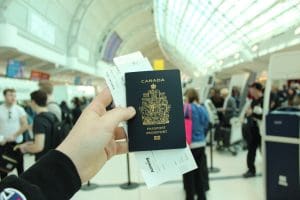Are you an immigrant who dreams of becoming a Canadian citizen? Or perhaps you’re just curious about the process and requirements involved in obtaining citizenship in the Great White North. Either way, this blog post is for you! We’ll be taking a deep dive into the roadmap to Canadian citizenship – exploring everything from eligibility criteria and application procedures to language proficiency requirements and more. So grab a cup of coffee, settle in, and let’s get started on your journey toward becoming a proud Canadian citizen!

What Is Canadian Citizenship?
Canada is a welcoming and inclusive country that is proud to offer citizenship to individuals from all walks of life. Canadian citizenship confers a number of rights and privileges, including the right to live and work in Canada, vote in elections, and access to public healthcare and education.
To be eligible for Canadian citizenship, you must meet certain requirements, such as being 18 years of age or older, having lived in Canada as a permanent resident for at least three years, and demonstrating adequate knowledge of English or French. If you are not sure whether you meet all the requirements, you can complete an online assessment tool to find out.
Once you have determined that you are eligible for Canadian citizenship, you can begin the application process. The first step is to gather all the required documentation, such as your birth certificate and proof of residency. You will then need to submit your application forms and supporting documents to Citizenship and Immigration Canada (CIC). If your application is successful, you will be invited to attend a citizenship ceremony, where you will take the oath of citizenship and receive your Canadian passport. Congratulations – you are now a Canadian citizen!
The Eligibility Requirements for Becoming a Citizen of Canada
In order to become a citizen of Canada, you must:
- Be 18 years of age or older
- Be a permanent resident of Canada
- Have lived in Canada for at least 3 out of the last 5 years
- Have knowledge of English or French
- Pass a citizenship test (if you are between the ages of 14 and 64)
- Take an oath of citizenship

How to Apply for Canadian Citizenship
To apply for Canadian citizenship, you must first be a permanent resident of Canada. You will then need to meet certain requirements, including:
- Being 18 years of age or older
- Having lived in Canada for at least 3 years (1095 days) before applying
- Having filed taxes in Canada for at least 3 years during your residency
- Demonstrating adequate knowledge of English or French
- Passing a citizenship test (if you are between the ages of 18 and 54)
- Proving that you have not been convicted of any serious crimes
- Demonstrating that you understand the rights and responsibilities of Canadian citizens
Once you have met all requirements, you will need to complete an application form, pay the applicable fees, and submit your application with all supporting documents. Once your application has been reviewed and approved by Immigration, Refugees, and Citizenship Canada (IRCC), you will be invited to attend a citizenship ceremony where you will formally receive your Canadian citizenship.
The Immigration and Refugee Protection Act and the Rules Governing Canadian Citizenship
The Immigration and Refugee Protection Act (IRPA) is the primary legislation governing immigration to Canada. The Act sets out the rules for who can enter and remain in Canada and establishes the framework for administering the immigration system. The Citizenship Act provides the rules governing Canadian citizenship.
The IRPA came into force on June 28, 2002, replacing the previous Immigration Act. The IRPA applies to all foreign nationals seeking to come to Canada, whether they are applying for a visa, permanent residence, or refugee status.
The main objectives of the IRPA are to:
- Protect the health and safety of Canadians
- Maintain the security of Canadian society
- Promote social cohesion and harmony in Canada
- Protect legitimate economic interests by ensuring that foreign nationals do not take jobs away from Canadians or unduly depress wages and
- Uphold Canada’s international human rights obligations.
Under the IRPA, foreign nationals can be refused entry to Canada if they are deemed to be a security risk, have been involved in war crimes or crimes against humanity, have been convicted of serious criminal offenses, or if their entry would pose a health or financial burden on Canadians. The Citizenship Act sets out who is eligible for Canadian citizenship and outlines the requirements for applying for citizenship. To be eligible for citizenship, an applicant must have lived in Canada as a permanent resident for at least three years (1,095 days), among other requirements.
The Different Types of Canadian Immigration Programs
There are three different types of Canadian immigration programs:
The Federal Skilled Worker Program is for people who have skilled work experience in certain occupations. To be eligible, you must have at least one year of continuous full-time or equivalent paid work experience in the last 10 years in an occupation that is listed on the National Occupational Classification (NOC) list. You must also meet the minimum language requirements and have enough money to support yourself and your family after you arrive in Canada.
The Federal Skilled Trades Program is for people who want to become permanent residents based on their skills and training in a particular trade. To be eligible, you must have at least two years of full-time work experience (or an equivalent amount of part-time work) in a skilled trade within the last five years. You must also meet the minimum language requirements and have enough money to support yourself and your family after you arrive in Canada.
The Provincial Nominee Program is for people who want to immigrate to a specific province or territory. Each province and territory has its own criteria for selection, but all programs require that you have the intention of living and working in that province or territory. You may need to meet additional requirements, such as having a job offer from an employer in that province or territory or having certain skills or qualifications.

The Application Process and the Required Documents
Once you have determined that you are eligible, you can begin the application process. The first step is to gather all of the required documents. These include:
- A valid passport or travel document
- 2 recent passport photographs (taken within the last 6 months)
- Proof of your permanent resident status in Canada (such as a PR card)
- Your birth certificate (or other proof of citizenship if you were born outside of Canada)
If you have changed your name since birth, you will need to provide official documents confirming this change. Examples include a marriage certificate or divorce decree. You will also need to provide police certificates from any country you have lived in for 6 months or more since turning 18, even if it was not part of your continuous residency in Canada. A police certificate is an official document that states whether or not someone has a criminal record. In addition to these required documents, you will also need to submit an application fee and sign an oath.
Preparing for the Final Canadian Citizenship Test
The final Canadian citizenship test is a written exam that tests your knowledge of Canada and of the responsibilities and privileges of citizenship. The test is based on the information in the Discover Canada study guide. To help you prepare for the final citizenship test, we have put together a list of resources that will give you a better understanding of what to expect on the test day.
1) Take a practice citizenship test: There are many online resources that offer free practice tests. Taking a practice test will help you become familiar with the types of questions that will be asked on the actual citizenship test. It is also a good opportunity to assess your level of knowledge about Canada.
2) Attend a citizenship class or workshop: There are many organizations across Canada that offer citizenship classes or workshops. These classes can help you better understand the requirements for becoming a Canadian citizen as well as review important material from the Discover Canada study guide.
3) Speak with someone who has recently taken the citizenship test: If you know someone who has recently taken the Canadian citizenship test, ask them about their experience and what they found most challenging about the process. This can give you valuable insight into what to expect on test day.
How to Obtain a Permanent Resident Card
If you are a permanent resident of Canada, you may apply for a permanent resident card. This card is proof of your status as a permanent resident and allows you to live and work in Canada indefinitely. To be eligible for a permanent resident card, you must:
- Be at least 18 years of age
- Be a permanent resident of Canada
- Have lived in Canada for at least three years
- Be able to prove that you have ties to Canada and
- Be able to pass a security check.
If you meet all of the above criteria, you can apply for a permanent resident card by submitting an application to Immigration, Refugees, and Citizenship Canada (IRCC). The application must be accompanied by the required documentation, which includes proof of your identity, proof of your status as a permanent resident, and photographs. Once your application is received, IRCC will review it to ensure that you meet the eligibility requirements. If your application is approved, you will be issued a permanent resident card.
Conclusion
As you can see, the process of Canadian citizenship is a complex and lengthy one. However, with proper guidance from an experienced immigration lawyer or consultant, it is possible to make sense of all the paperwork and regulations involved in obtaining Canadian citizenship. By familiarizing yourself with the different steps required in this process and understanding your rights as a potential citizen, you can work towards achieving your goal of becoming a proud citizen of Canada!








